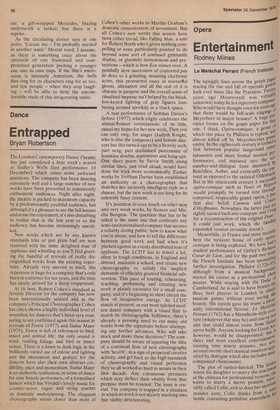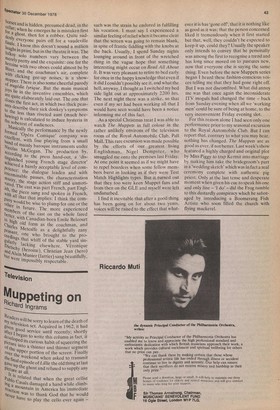Opera
Entertainment
Rodney Milnes
Le Marechal Ferrant (French InstiWte) The squiggly lines across the graph Palle tracing the rise and fall of operatic genres r ,,' look ever more like the Pyrenees. Twellt,) years ago Monteverdi was virtu unknown; today he is a repertory comPnsernWho would have thought even ten years ag,.4 that there would be full-scale stagings " Meyerbeer in major houses? A huge Pre: cipice looms on the graph paper for dial one, I think. Opera-comique, a genre which this piece by Philidor is typical, viat; almost killed off by Meyerbeerian opera. In the eighteenth century it forinedi". link between popular fairground entertainments and more formal musical petformances, and matured into the setnumber-and-dialogue form mastered bY Boleldieu, Auber, and eventually the Pas,,: toral as opposed to the satirical OffenhaeL But in the nineteenth century a success"; opera-comique such as Faust or would promptly be turned into throng'z composed, respectable grand opera, a law that also befell Carmen and Ontese d'Hoffinann. Nowadays the latter Pair, ar;,2 rightly turned back into compqie, and I Lc)" for a reconstruction of the original Faiistit could just work, which the broil° expanded version certainly doesn't. „ Meanwhile, in France and more recen" here the treasure house of early oPer,a; comique is being explored. We have haud student performance of Gretry's Richar Coeur de Lion, and for the past two Yrsea the French Institute has been sponsorl further investigation. Philidor (1726-9 d, although from a musical backgrouriss started his career as a professional died master. While staying with the Duke he Cumberland, he is said to have beaten rul, three best players in London in sinithe taneous games without even seeing, 0. boards. His travels gave his music a Pico antly international flavour. Le Marece Ferrant (1762) has a Mannheim-style &vie ture (whatever that may be) and one ortap airs that could almost come from Itarllo, opera buffa. Anyone looking for Great f: is however, would be disappointed; sheer and most excellent entertainnie running time ninety minutes, two around twenty short musical numbers ser c, rated by dialogue which also includes una companied chansoneues. frier The plot of rustith-farcical. The fa wants his daughter to marry the coach190 at the château for professional reasons+ So. wants to marry a merry peasant, in.e tably called Cohn, and so does her tari;le maiden aunt; Colin drinks from a:gifor bottle containing primitive anaesthetic horses and is hidden, presumed dead, in the cellar; when he emerges he is mistaken first f_?1* a ghost, then for a robber. Quite suddenly everyone pairs off for a vaudeville finale. I know this doesn't sound a million laughs in print, but in the theatre it was. The folks solo numbers vary between the merely pretty and the exquisite: one for the heroine with two oboes could almost be by Bizet, and the coachman's air, complete with clicking gee-up noises, is a showstoPPer. There is also some cheerful parody f tragedie lyrique. But the main musical Joys lie in the inventive ensembles, which are quite elaborately laid out. The one that Closes the first act, in which two thick peasants describe their sick donkey's symptoms to the less than riveted aunt (much beehawing) is calculated to induce hysteria in the soberest of audiences. Musically the performance by the newly formed 'Opera Comique' company was ebxectlent, with fine playing from a small and of mainly baroque instruments under 11,1c°Ias McGegan. The production by, _ ,ccording to the press hand-out, a 'clisnguished young French stage director' achieved a barely acceptable level of competence: the dialogue leaden and with Interminable pauses, the characterisation rat172Y, the stage action stiff and unmotiVated. The cast was part French, part Engltsh, the piece sung and spoken in French, vnth all that that implies: I think the cornPa,,nY would be wise to plump for one or the n_Iner in future. The more experienced ',nenibers of the cast on the whole fared joe tter, with Canadian-born Emile Belcourt n high old form as the coachman, and Charles Metcalfe as a delightfully zany Peasant, one who brought to the proceeding that whiff of the stable yard sinIS4.141-1Y lacking elsewhere. Veronique a lets% (heroine), Christian Jean (hero) bn. d Alain Munier (farrier) sang beautifully, nt were impossibly respectable.























































 Previous page
Previous page